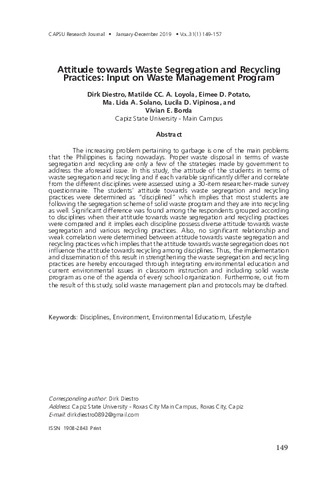Attitude towards waste segregation and recycling practices
| dc.contributor.author | Diestro, Dirk | |
| dc.contributor.author | Loyola, Matilde Corazon Cristina A. | |
| dc.contributor.author | Potato, Eimee D. | |
| dc.contributor.author | Solano, Ma. Lida A. | |
| dc.contributor.author | Vipinosa, Lucila D. | |
| dc.contributor.author | Borda, Vivian E. | |
| dc.coverage.spatial | Capiz | en |
| dc.date.accessioned | 2022-01-17T06:48:37Z | |
| dc.date.available | 2022-01-17T06:48:37Z | |
| dc.date.issued | 2019-01 | |
| dc.identifier.citation | Diestro, D., Loyola, M. C. C. A., Potato, E. D., Solano, M. L. A., Vipinosa, L. D., Borda, V. E. (2019). Attitude towards waste segregation and recycling practices: Input on waste management program. 31(1), 149-157. | en |
| dc.identifier.issn | 19082843 | |
| dc.identifier.uri | http://repository.capsu.edu.ph/handle/123456789/78 | |
| dc.description.abstract | The increasing problem pertaining to garbage is one of the main problems that the Philippines is facing nowadays. Proper waste disposal in terms of waste segregation and recycling are only a few of the strategies made by government to address the aforesaid issue. In this study, the attitude of the students in terms of waste segregation and recycling and if each variable significantly differ and correlate from the different disciplines were assessed using a 30-item researcher-made survey questionnaire. The students’ attitude towards waste segregation and recycling practices were determined as “disciplined” which implies that most students are following the segregation scheme of solid waste program and they are into recycling as well. Significant difference was found among the respondents grouped according to disciplines when their attitude towards waste segregation and recycling practices were compared and it implies each discipline possess diverse attitude towards waste segregation and various recycling practices. Also, no significant relationship and weak correlation were determined between attitude towards waste segregation and recycling practices which implies that the attitude towards waste segregation does not influence the attitude towards recycling among disciplines. Thus, the implementation and dissemination of this result in strengthening the waste segregation and recycling practices are hereby encouraged through integrating environmental education and current environmental issues in classroom instruction and including solid waste program as one of the agenda of every school organization. Furthermore, out from the result of this study, solid waste management plan and protocols may be drafted. | en |
| dc.language.iso | en | en |
| dc.relation.uri | http://researchjournal.capsu.edu.ph/index.php/crj20191/article/view/102 | en |
| dc.rights | Attribution-NonCommercial-NoDerivatives 4.0 International | * |
| dc.rights.uri | http://creativecommons.org/licenses/by-nc-nd/4.0/ | * |
| dc.subject | Disciplines | en |
| dc.subject | Environment | en |
| dc.subject | Environmental Education | en |
| dc.subject | Lifestyle | en |
| dc.subject.lcsh | Environmental education | en |
| dc.subject.lcsh | Environmental education--Evaluation | en |
| dc.subject.lcsh | Lifestyles--Health aspects | en |
| dc.title | Attitude towards waste segregation and recycling practices | en |
| dc.title.alternative | Input on waste management program | en |
| dc.type | Article | en |
| dc.citation.journaltitle | CAPSU Research Journal | en |
| dc.citation.volume | 31 | en |
| dc.citation.issue | 1 | en |
| dc.citation.firstpage | 149 | en |
| dc.citation.lastpage | 157 | en |


